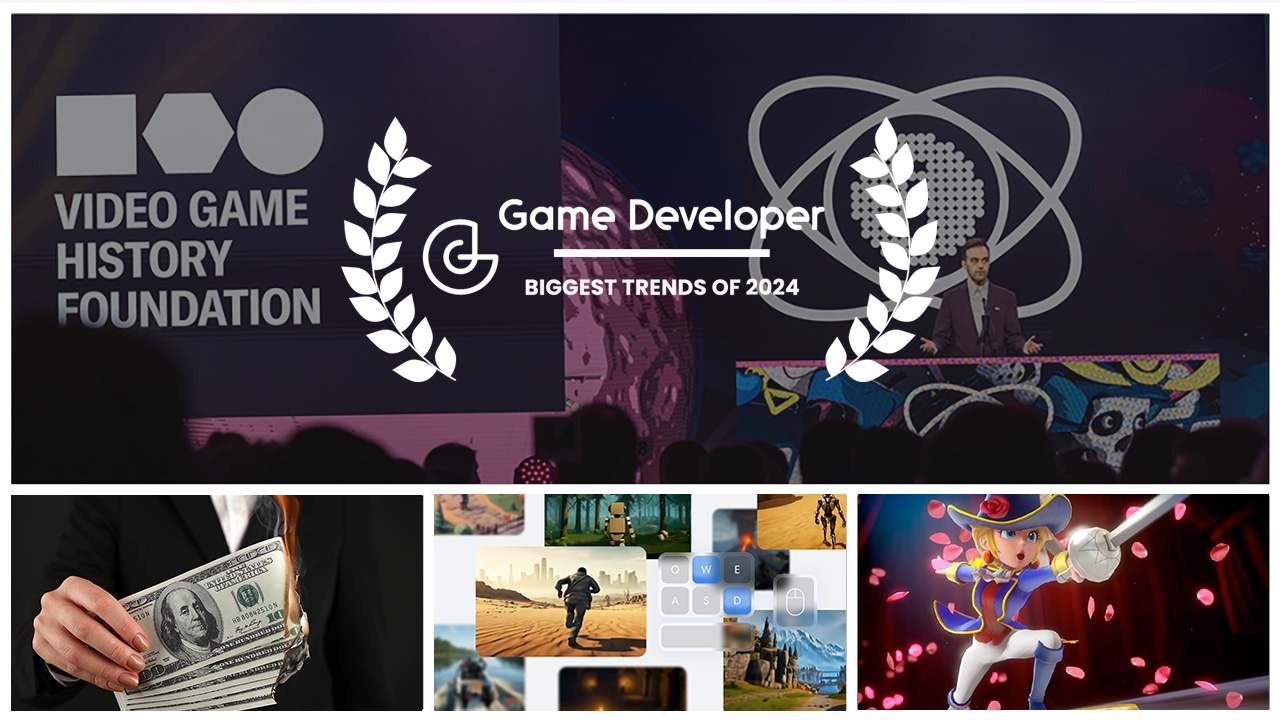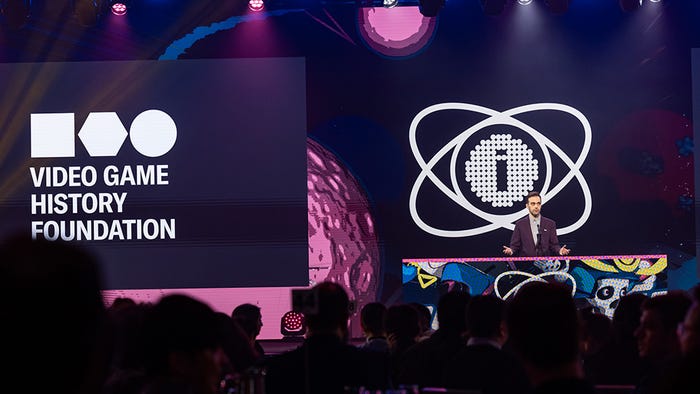Trending
Opinion: How will Project 2025 impact game developers?
The Heritage Foundation's manifesto for the possible next administration could do great harm to many, including large portions of the game development community.

At first we were tempted to declare one single trend of 2024 by scrawling the word "capitalism" in big bold red letters on a header image and then walking away. Except then our bosses reminded us that we are a news outlet and it's our job to explain concepts to readers and not just boldly shout nonsense before walking offstage. "That," they said, "is what executives are for."
With one bright shining exception sitting down at the bottom of our list as a palette cleanser, the grip of raw, unfettered capitalism is what lurks under most of our major trends of the year. And we don't mean capitalism as in "commerce" whereby different parties participate in a competitive marketplace of exchanging goods, commodities, and services to serve different wants and needs. We mean "capitalism," whereby forces dedicated to extracting capital by any means necessary prioritize short-term profits and meteoric growth over the quality of product, the health of the community, or even their own interests.
Those misplaced goals drove the monied class into what sometimes seemed a literally feverish frenzy in the last year, as executives, investors, and sometimes studio heads all at times seemed to be caught in a strange sickness. Imagine someone laying in bed, crying out phrases like "chatgpt, make me an epic video game" or "true digital ownership on the blockchain will unlock massive potential," or "our goal is not to push any specific agenda." While they toss and turn, the rest of us are stuck kneeling over them, applying a cold press to their forehead and tending their pus-filled wounds.
If we are to treat the patient we must identify the symptoms plaguing them. Some are minor, and might be cured with time and a placebo. Others may require stronger medicines which will have something of a bitter taste...

Image via Embracer Group
Microsoft laid off over 2,500 game developers this year. Sony carved through PlayStation Studios, cutting jobs across Guerrilla, Naughty Dog, Insomniac, and more. Take-Two downsized on multiple occasions, often refusing to provide comment or clarity when approached. Embracer continued its trend of treating workers like sacrificial lambs that can be fed to investors. EA made significant layoffs while lauding business "momentum" and dishing out $60 million in compensation to key executives. Netflix Games shuttered its only triple-A studio weeks before its newly-appointed VP of GenAI for Games announced his new role with a fresh bowl of word salad. Hold on. I need to catch my breath.
So many of those cuts followed flagrant spending, with Microsoft in particular looking utterly inept for dropping almost $70 billion on Call of Duty maker Activision Blizzard before suggesting it had to cut thousands of jobs to create a "sustainable business." Go figure. Smaller studios also struggled to maintain headcount in a market where funding and business opportunities are at a premium–and with the biggest players now on their knees, the idea of job security has become a heady fantasy for many developers.
The video game industry has entered an era dominated by content, brands, and IP. The idea that studios should nurture and support the talent behind their brightest releases in pursuit of new ideas has been dropped in favor of mass conglomeration and fast-following. Malaise and instability have become industry staples, manifesting as symptoms of corporate ineptitude that all too often results in developers-rather than the suit-clad decision makers–being thrust into the guillotine.
Only in a world where leaders are held accountable for their incompetence would you expect this to change as we head into 2025. We'd like to go there someday. —Chris Kerr, news editor

Image via Google
I like to imagine all the executives who've taken to social media or stood before investors to proclaim that generative AI tools are going to somehow birth video games our puny organic brains can barely conceive are pulling an industry-wide prank. "Let's see who can say the most outlandish shit," is what the messages in the WhatsApp group must read. It's probably called 'C E BROS' or something equally drab. Either that, or their families are being held hostage by the first self-aware iteration of ChatGPT and risk being churned into the emerging singularity.
I like to imagine that, because those are the only plausible reasons you would suggest generative AI is poised to deliver an "almost unimaginable collection of new capabilities" or allow players to "convert their imaginations into creations" before hard-cutting to a rudimentary maze formed out of cardboard boxes. Truly revolutionary.
Those examples come straight from execs at Netflix and EA. There are, of course, many more.
It's entirely possible that some generative AI tools might streamline development processes (it no doubt already has), but it's frankly embarrassing to see business leaders–who probably couldn't cobble together a cohesive video game asset if their life depended on it–behave as if the rise of generative AI tools (some of which are currently being pelted with lawsuits) is akin to the second coming of Christ.
Right now, the praise being lavished on generative AI tools by executives has no basis in reality, and seems designed to placate investors during a year when mass layoffs and studio closures have bludgeoned workers across the industry. It's an altogether depressing state of affairs that highlights the growing disconnect between those in the development trenches and the C-suite hivemind that seems intent on replacing creativity with "content." I wonder whether artificial intelligence could do their job? —Chris Kerr, news editor

Image via Game Developers Conference.
What does it mean to preserve video game history?
The answer is surprisingly complicated. For years we've documented the push-and-pull between copyright holders and historians, pitted against each other largely by the frustrating constraints of copyright law and market forces. Archivists are racing against the clock to ensure our community's storied annals are documented as best as possible. Video Game History Foundation founder and director Frank Cifaldi took to the stage at the 2024 Game Developers Choice Awards to plead for those in the audience to dig up what software and documents they can from their attics before they're lost for good.
Fighting to keep those assets accessible has proven dire. The Foundation this year announced that by its accounting, almost every game released before the year 2010 isn't legally available anymore. This data did little to budge the position of the Entertainment Software Association, which told the Library of Congress there was no possibility its members would support any form of remote access to delisted games. Its members see those unavailable titles as a commercial opportunity, and having them available to the public in such a form may harm their ability to repackage them for the future.
The contents of those games might be preserved—but due to the Library of Congress' ongoing refusal to allow DMCA exemptions for video games that are analogous to those available for film and literature—accessing those titles has become physically difficult. It's also narrowed the number of physical locations where this content is preserved. If the worst were to occur, what little has been preserved could literally go up in smoke.
The VGHF has been joined by allies like GOG and Epic Games, which have each made commercial commitments to keeping older titles playable as long as possible, but the decision by some like Blizzard Entertainment to pull their games from GOG rather than commit to more permanent availability shows the tension between profits and the public good.
Video game history is still locked away behind a vault whose walls are built from capital. But look at this way. If there's a vault, there's always a chance to put together a team for one last job... —Bryant Francis, senior editor

Image via Adobe Stock.
This layoff crisis of 2023 and 2024 makes it clear: the game industry needs social safety nets.
In between story after story about layoffs and studio closures, we also processed a steady stream of news about investors pouring cash into new studios in up-and-coming regions like Eastern Europe and Southeast Asia. As we discussed in July, this is driven both by emerging talent in these areas (who deserve to be rewarded!) and by the cheaper costs of living, which allows studios to employ more workers for the same price they’d have to pay in the United States and other high-cost-of-living areas.
This trend has been brewing for years, but picked up steam in 2024. Rising global inflation hit hard in areas where housing costs have shot way past the minimum wage. Softer-than-expected revenue drove companies like Bungie, Ubisoft, and Paradox Interactive to lay off workers in cities like Seattle and San Francisco, both regions where the cost of living has shot upward in the last decade. This problem extended northward too, as companies like Archiact, Gameloft Toronto, and Torn Banner Studios also made deep cuts (or went under). It's driven the need for studios to contract external development partners who can supply labor from cheaper-cost-of-living regions like Virtuos and Keywords.
Many of these companies make successful games! But if revenue softens even a little, the high overhead costs will plunge a company straight into the red.
This trend is maddening because it’s so outside the control of the video game industry, and large corporations have less incentive to push for any change. A tighter job market means they gain more control in salary negotiations and can push down costs by underpaying workers or taking advantage of those overseas contracts. Meanwhile Generative AI developers hope to exploit this issue by claiming their tools can be force multipliers for smaller teams—a pitch that makes it easier for some to swallow the concerns over unauthorized training data and high energy costs.
It doesn’t have to be this way. Game studios shouldn’t need to only live on billion dollar hits to keep the lights on, and the fear of keeping a job shouldn’t force workers to face poverty wages. Some, like the Washington State Department of Commerce, are laying the groundwork for economic incentive programs for game studios.
A better world is possible if developers are willing to fight for it. Battling to lower the cost of living and support programs that can keep developers financially afloat between jobs (like unions?) will make for a healthier, happier business that can do what it does best: make great, innovative game. —Bryant Francis, senior editor

Image via Nintendo.
It's not just that Princess Peach and the titular princess Zelda from The Legend of Zelda got their "own" games this year. After all, these days, it's not hard to find a game with a playable woman protagonist. No, it's that two of the earliest and most popular women in video games finally broke the glass ceiling.
For decades, the princesses Zelda and Peach have been relegated to side characters in games that arguably could not exist without them; without Princess Peach, Mario would have had no reason to fight Bowser. Without Zelda, The Legend of Zelda would have just been The Legend of. As time has worn on, both have taken on more in their respective series, with Zelda playing a larger narrative role in LOZ and Princess Peach acting as a playable character in multiple Mario spin-offs. But this is the first time they've starred in a console title as the lead.
And to that, we say, congrats, ladies! It's about damn time. —Holly Green, Community Editor
Thank you for exploring the top five trends of 2024 with us! This article is one of many 2024 reflections hitting Game Developer this month, with more to come! For even more thoughts and insights on the best of 2024, check out our Game Developer’s 2024 Wrap-Up keyword to catch up on all our End of Year content.
Read more about:
FeaturesGame Developer EssentialsTop StoriesGame Developer's 2024 Wrap-Up: Top Games, Devs, and TrendsYou May Also Like